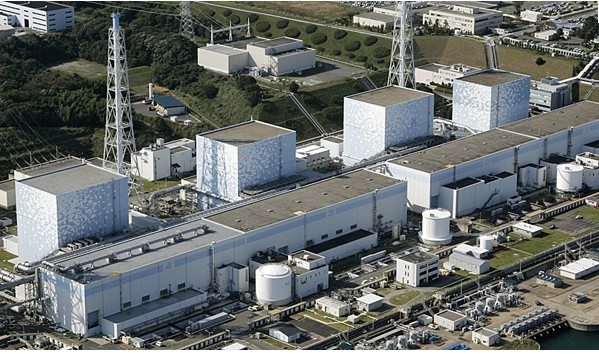An accidental leak of highly radioactive water into the ocean from a Japanese nuclear plant was stopped Wednesday, boosting efforts to contain the worst nuclear accident since Chernobyl 25 years ago.
The leak was thought to be a source of spiking radiation levels in the sea, which prompted Japan to announce its first seafood radiation safety standards following the discovery of fish with elevated contamination.
To stop the long-running leak from the Fukushima plant on the Pacific coast, operator TEPCO had injected sodium silicate, a chemical agent known as “water glass”, to solidify soil near a cracked pit where the water had been escaping.
The pit, which has a 20-centimetre crack in its wall, is linked to the plant’s reactor No. 2, one of several that had their cooling systems disabled by a catastrophic earthquake-tsunami disaster on March 11.
“Workers confirmed at 5:38 am (2038 GMT Tuesday) that the water running out of a pit had stopped,” Tokyo Electric Power Co. (TEPCO) said in a statement on Wednesday.
Several unsuccessful attempts had been made to try to plug pipes that run to the pit, using a polymer and even newspapers and sawdust, and an effort to seal the crack with cement had also failed to stop the leak.
Leaking water from the Fukushima plant has reached more than 1,000 millisieverts and is thought to be the source of radioactive iodine-131 readings in the sea that have hit more than 4,000 times the legal limit.
Amid increasing unease about water contamination, Japan has imposed a legal limit for radioactive iodine in fish and may widen tests to cover a larger area, after elevated levels were discovered in a fish caught off Ibaraki prefecture, south of the crippled plant.
The stopping of the leak is the first piece of major good news for several days in the battle to control the crisis at the Fukushima plant, where the natural disaster triggered explosions and radiation releases.
The contamination has forced the evacuation of tens of thousands of people within 20 kilometres (13 miles) of the plant, affected agriculture and fishing, and triggered health scares as far away as Tokyo.
India on Tuesday banned all food imports from Japan, the first country to impose a blanket block. Several countries including China, Singapore and the United States have barred food from some Japanese prefectures.
Fishing has been banned within 20 kilometres of the stricken plant, matching the radius of the evacuation zone on land.
TEPCO continued a separate operation to release lower-level radioactive water into the sea to free up urgently needed storage space for water so toxic that it is hampering crucial repair work.
TEPCO is dumping 11,500 tonnes, or more than four Olympic pools’ worth, of the less radioactive water, raising concerns about marine life in the island nation, where seafood is a key source of protein.
As well as fish, iodine above legal limits has been detected in vegetables, dairy products and mushrooms, triggering shipping bans, but officials had said seafood was less at risk as ocean currents and tides dilute dangerous isotopes.
But the government in Seoul has questioned TEPCO’s deliberate water dumping, saying the proximity of the two neighbours made the action “a pressing issue” for South Korea.
Shares in TEPCO — Japan’s biggest power utility — tumbled anew Wednesday. They were down 16.85 percent in early trade after plunging to 362 yen Tuesday — their lowest ever close — amid concerns the firm will face huge compensation bills.
Some analysts estimate TEPCO could face claims of more than 10 trillion yen ($120 billion).
The wider economic fallout from Japan’s triple calamity — the massive earthquake, giant tsunami and the nuclear crisis — is likely to drive the country into recession in coming months, said a survey of economists.
The disaster, which has left more than 12,000 dead and over 15,000 missing, has also hit exports, business confidence and consumer spending, economists say.
The government is planning a first emergency budget of more than three trillion yen ($35 billion), Kyodo news agency reported, quoting ruling party politicians saying total spending could top 10 trillion yen.











